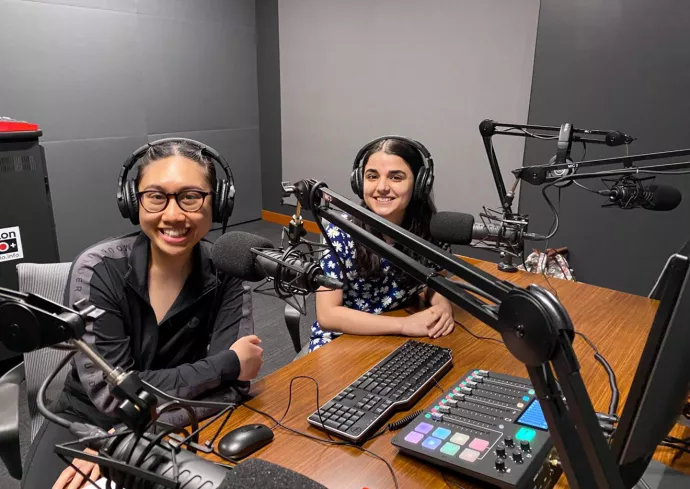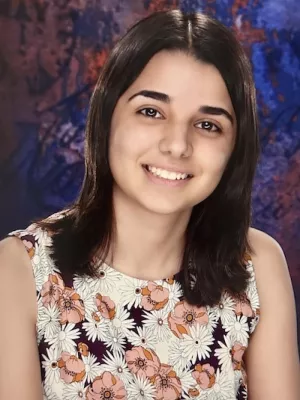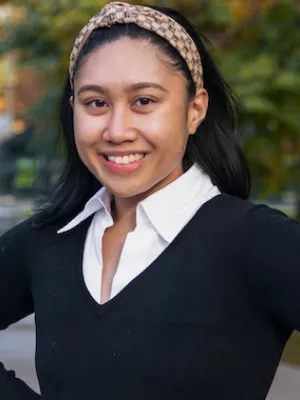
Fish Outta Water: UTM podcast duo helps students with unofficial university survival guide
When Loridee De Villa and Harleen Kundan participated in a Research Opportunity Program at U of T Mississauga, little did they know that by the end of the project they would both become seasoned podcasters.
Providing students with the chance to participate in the research of a faculty member while earning course credit, the Research Opportunity Program lets students become involved in practical, cutting-edge research, working one-on-one with leading faculty members across a range of academic units. Both De Villa and Kundan worked under the direction of Mairi Cowan and Ken Derry from Historical Studies on a project called ‘Teaching and Learning Resiliency: Teaching Students to Learn from Failure’ as a part of the larger ‘Failure: Learning in Progress’ (FLIP) project.
Much of their collaborative analysis took place over Zoom calls, where the pair had the opportunity to also reflect and draw upon the lessons they learned at university.

“When we were finishing up coding the data from the student surveys for this project, Loridee and I ended up having a lot of discussions that revolved on what the students were saying, and we did see several connections to our own university experiences,” says Kundan.
It was during these calls they started to consider broadening the project as a podcast so others might be privy to their lively conversations.
“We decided that we wanted to make something – an informal and creative project – that students would actually want to listen to and that would hold some appeal for them, while also not diverting away from our research and the data we collected,” says Kundan.
Neither Kundan, a fourth-year student specializing in history and political science with a minor in sociology, nor De Villa, a third-year student in biology health science with a double-minor in psychology and religion, had ever produced a podcast. Their discussions with Cowan and Derry, who had noted that students sometimes hold back when it comes to creative projects, helped spur them to take a risk by making a podcast.
The two launched their 12-episode podcast series, Fish Outta Water, which includes four foundational episodes and eight bonus episodes with interviews and expertise from several scholars. They deem the series an “unofficial university survival guide.”
“We scripted some of the episodes based on conversations that we had naturally, and we thought students might find the information helpful as well as entertaining” says De Villa. “For the first episodes of this podcast, it was just us talking to each other, analyzing the data, telling our own stories. So, when we created the extended and the bonus content, we included interviews that we conducted that were a natural fit with the material that came from our discussions and the student data.”

The outcome is a podcast that provides comprehensive and practical advice for students weathering their first years in higher education, which their professors say they intend to flag for other educators to help promote it more broadly among students.
“We were just so impressed and couldn’t be prouder of Loridee and Harleen for their creativity – scripting, stepping up to the mic and figuring out the editing piece, and finally making this entire series,” says Derry.
“Not only did Harleen and Loridee take this opportunity to share what they learned and work in the data to produce some really great content, but they also created a resource to help other students get their bearings when they are just setting out in academia,” adds Cowan. “Their dedication to see this project through and help others is a truly generous effort and a remarkable accomplishment.”
Kundan and De Villa might create more episodes in the future, incorporating more research and other participants from the FLIP project.
“Our hope for this podcast is just that it really is a resource for students,” says De Villa.
“I hope that students can listen to our stories and have a laugh, but at the same time feel inspired by our personal experiences, recognizing that you can move beyond failure. I also hope students know that there are many educators who are looking out for them and there are many resources at the school that are able to help.”
More:
- Listen to all 12 episodes of Fish Outta Water podcast.
- View to the U podcast: Harleen and Loridee
- Find out more about UTM Library's Outer Circle Recording Studio.
- The Research Opportunity Program is run by the Experiential Education Unit in UTM's Office of the Vice-Principal, Academic and Dean.
